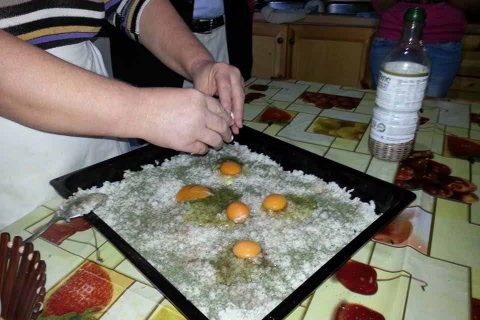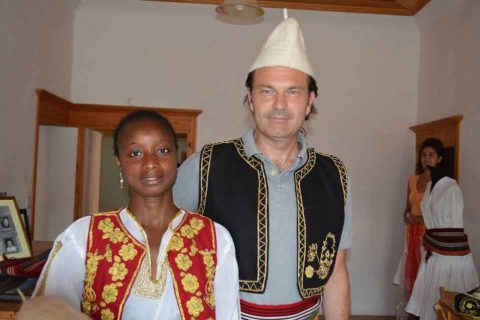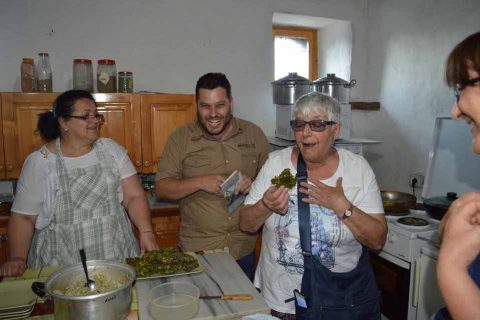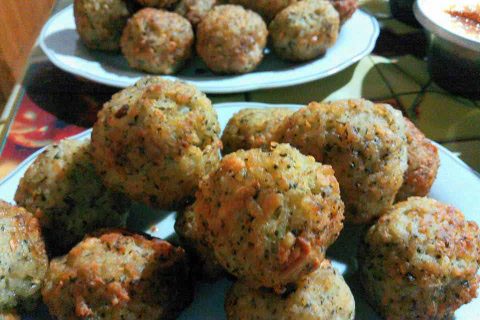A hands-on experience with the living tradition of Gjirokastra – be Gjirokastrian for a while. This Tour is designed to last 7 days. The visitors will experience features and aspects of daily life, culinary, heritage sites, in UNESCO Gjirokastra and its rural area.
Day 1 Gjirokastra at first sight – a Chronicle in Stone
Starting time 09.00
Introduction to the history and heritage of Gjirokastra
- Visit the Castle and the Gjirokastra Museum.
Ancient handicrafts and artisan traditions of Gjirokastra
- Meeting artisans and handmade souvenir producers in the Medieval Bazaar
- Shopping for personalized souvenirs
Tasting the mastery of Gjirokastra home cooking
- Lunch with homemade food in a typical historic house,
- Tasting traditional dishes of Gjirokastra: qifqi and hoshaf
Written in Stone : the unique architecture of the Gjirokastra
- Walk upon the unique cobblestone streets
- Medieval Bazaar, Palorto neighborhood, and meeting a stone-carving master
- Socializing with the locals
Ottoman-style Gjirokastra houses and life in the past
- Visit the tower house of Zekate and meet the family
- Visting the Babameto House,
- An example of revitalization in the effort to save the stone city
Evening of entertainment and traditional dinner at the 19th century Babameto House
- Cooking, dancing, and singing together
- Iso-polyphonic singing, traditional dance, and local jokes and anecdotes
Day 2 Life in Gjirokastra – the challenge of saving the historic city
Starting time 09.00
Visiting the Skenduli House
- The challenge of preservation and keeping the authenticity
A visit to the newly restored home of the most famous Albanian writer: Ismail Kadare
- The architecture and life of Kadare’s hometown,
Traditional dresses and costumes
- Visit the Ethnographic Museum and meet a senior artisan who works on costumes
Lunch from a traditional wood stove
- Lunch cooked together
- Three local recipes prepared for guests with written recipes to take home
Iso-polyphony: the UNESCO-listed Art of Singing
- Meeting an Iso-polyphonic group
- Learning some traditional dance
Relaxation
- Visit the “Mother of the Waters” source and lake park
- Walking/cycling/driving 4 km from Gjirokastra
- Dinner at “Freskia”, restaurant by the lake
Day 3 – A day in the Gjirokastra Countryside
Starting time 09.00
Traveling through picturesque Drino Valley, its rich history and villages
- Amazing landscape overlooking the Drino Valley
- Ancient heritage and rural life
Visit the Archaeological Park of Antigoneia
- The ancient town Antigoneia of famous King Pyrrhus of Epirus a city built by his love and burnt by the hatred of his enemies
- Tasting the genuine natural food of the Saraqinisht village
- A picnic on- site
Visiting the village of Saraqinisht and Saint Nicolas church built in 1666
- Meeting Albanian and Aromanian local communities a Latin speaking people native to the southern Balkans
Life in countryside
- Visit Karjan village and the garden of Krisafi family
- A dinner made exclusive from the family garden products
- Visit Krisafi family’s garden
- Choose your fresh vegetables for dinner in the family garden
- Taste dhalla, homemade raki (strong alcoholic distillation of grapes) and more
Day 4 –Albania’s inter-religious harmony and religious heritage in the Gjirokastra region
Starting time at 09.00
Bektashi Muslim Order, its mysticism, and rituals
- Visit the Bektashi Monastery at Melan
Visit Libohova
- Have a drink under the 220-years-old monumental Plane Tree
Lunch at Libohova
- Local delicacies from chef Sedat
The village named after the Holy Cross
- Visit Labova e Kryqit village and the Cross Church (13th c) socializing with the locals at the square of the village
Tour of other religious buildings in Gjirokastra city
- The Mosque of the Bazaar, Mechite Mosque, and Saint Sotira Church
- Dinner : on your own
Day 5 – In the footsteps of Lord Byron and warrior leader, Ali Pasha of Tepelena
Starting time 09.30
Visit to the town of Tepelena, the castle of Ali Pasha and the cable-stayed bridge at Vjosa River.
- Stop at Bënça
- Visit the Aqueduct built by Ali Pasha
Lunch at the Cold Water sources near Vjosa river
- Visit a farm in the valley (Humelica) and taste traditional drinks
Isolation and Paranoia under Communism
- Visit to the Cold War Tunnel under the Castle and the Armament’s Museum
- Meeting with two locals who tell their different stories about life under Communism
Optional visit at the standing bridge of the Ali Pasha
- Part of aqueduct built for supplying water to the castle
A walk in the upper part of Gjirokastra: Dunavat neighborhood
- Dinner at Kuka tavern
Day 6 –Old routes to the Sea- Butrint UNESCO World Heritage Site
Starting time 09.30
Following the Drino river Valley and drive through Muzina Pass
- In the trails of the ancient caravan routes to the sea through a picturesque landscape full of history and archaeology
A stop at Ksamili at the coast in front of Corfu Island
Enjoying the coast view and telling the story:
- A new small town established first in the communist era, Ksamili, was intended to be a “proud window” of the regime as a splendid example of the “voluntary” work of the youth – it is not
Visit the National Park of Butrint, and one of the most fascinating archaeological sites in the Balkans.
- The archaeology and nature of Butrint forge a unique combination of ancient ruins,Mediterranean forests, and salted lakes
Lunch at the seaside
- Local fish and mussels from the lake will be on the menu of the day
- Crossing the Vivari Channel and meeting the local community at Xarra and Shëndëlli village
On the way back to Gjirokastra stop at:
- Monastery of Mesopotam (11th c. AD)
- Blue Eye water sources.
- Dinner organized at Terihat village in the Drino Valley where the Greek minority lives
- A fine restaurant with some traditional Greek flavor
Day 7 –Vjosa treasures – Vjosa is the last wild river in Europe
Starting time 09.00
Visit the hot springs of Lengarica
- The springs are almost in a natural state
- The sulphurous water temperature is 26-320 C (79-900 F)
- and is highly appreciated for its remedial qualities
- Bathing in the hot springs and walk along the canyons of the river
Visit the Bënja village and its medieval Saint Mary Church
- The village has recently been declared a Protected Historic Area by the Albanian government
- Organised lunch in the area of Bënja National Park
- Picnic besides the river
- Afternoon visit in the town of Përmet
- The city of flowers and of typical “saze” music
Meetings with artisans and traditional food producers of the ProPermet Association
- Taste the jams and sweets of Përmet (the famous Gliko)
Organized dinner with a local family
- Enjoy food in a traditional courtyard with traditional music
No of people: 5-12
Activity: 9 hours
Accommodation: Babameto House or similar. Traditional breakfast included.










